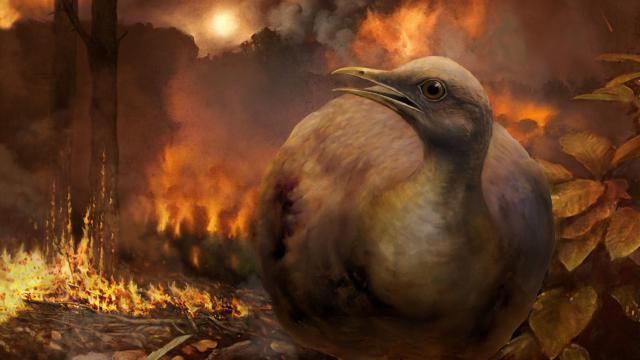The asteroid that hit Earth 65 million years ago didn’t just suck for the big lizards. Shockwaves likely knocked down the trees, fires would have burned up entire forests, and less light would have meant fewer plants. What if you were a bird who lived in those trees! That was your home!
New research shows how the strike would have decided which species made it and which species didn’t. Without trees, only ground-dwelling birds would have survived. This surely would have had a profound impact on the kinds of species still around today – a bottleneck in evolution’s history that changed the course of life forever.
“The elimination of forests basically left a long-term signature on the subsequent evolutionary history of birds,” study author Daniel J. Field, an
evolutionary paleobiologist at the University of Bath, told Gizmodo. “We think that only non-tree dwelling bird species would be able to pass through.”
The researchers created their hypothesis by looking at a host of different data points. For example, tree pollen went missing from the fossil record for a thousand years after the asteroid strike. Bird fossils from that time period seem only to consist of ground-dwellers. Put that together, and the story emerges: An asteroid hit Earth and wiped out the trees, meaning an evolutionary dead-end for any bird that couldn’t make do elsewhere. The study was published in Current Biology.
You might ask why are there so many tree-dwelling birds today. It seems that once the forests came back, there was a massive diversification of species, and birds would have capitalised on the new niches and colonised them quickly, said Field.
Other scientists said this research is an interesting way to tell the evolutionary story following the mass extinction. “This paper presents an intriguing explanation for why only a few lineages of birds survived the mass extinction event and then later diversified tremendously in response to recovering habitats,” Sushma Reddy, assistant professor in biology at Loyola University Chicago, who was not involved with the study, told Gizmodo. “It sets a new hypothesis to be tested as more fossils are discovered.”
But absence of evidence isn’t the evidence of absence – just because you don’t find something doesn’t mean it’s not there. There could be more to the story yet to uncover. “For the fossils we know about, it fits the hypothesis laid out here. However, birds are notorious for have a very limited fossil record,” said Reddy. Perhaps there’s more evidence to support the hypothesis in other groups of animals, like mammals.
Still, mass extinctions are important pages in the book of Earth’s history. Life, uh, finds a way.
